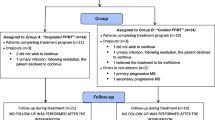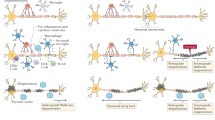Summary
Neurogenic bladder dysfunction, the main cause of chronic urinary tract infections in multiple sclerosis (MS), is efficiently treated by bladder training with ultrasound control of the residual urine. However, the beneficial effects of bladder training in the hospital are often lost within a short time when the patient returns to his home. Reexamination at home of 97 MS patients with increased residual urine and/or chronic urinary tract infections showed that the group which claimed to continue bladder training at home had significantly less residual urine at home than the group which did not continue bladder training at home. The residual urine decreased from 210 ml on average to almost normal while the patients did bladder training in the hospital, but the volume nearly doubled within a short time at home. Thus, more decentralized rehabilitation by family members, volunteer personnel or local nurses is necessary. Decentralized symptomatic therapy is the most efficient treatment of MS at present. Family members, volunteers, and local nurses, however, need training. Without these improvements in decentralized rehabilitation the hospital treatment of MS is of little benefit because urinary tract infection quickly recurs at home. For efficient bladder training the patient needs feedback regarding the residual urine; this can be provided with minimum risk by ultrasound sonocystography. In those rare cases in which bladder training does not work, intermittent catheterization must be carried out by the patients or their families, volunteer personnel or a local nurse. A continuous indwelling catheter should not be used. Antibiotic treatment should be applied only on the basis of a precise bacteriological diagnosis.
Zusammenfassung
Neurogene Blasenstörungen sind die Hauptursache der chronischen Harnwegsinfekte bei der Multiplen Sklerose (MS); sie können wirksam behandelt werden durch Blasentraining mit Kontrolle des Restharns. Die günstige Wirkung des im Krankenhaus erlernten Blasentrainings geht jedoch oft binnen kurzer Zeit verloren, wenn der Patient nach Hause zurückkehrt. Eine Nachuntersuchung zu Hause von 97 MS-Patienten mit erhöhtem Restharn und/oder chronischem Harnwegsinfekt zeigte, daß jene MS-Krankengruppe, die bei der Aufnahme erhöhten Restharn hatte und angab, daheim das Blasentraining fortgesetzt zu haben, signifikant weniger Restharn hatte als jene Krankengruppe, die zugab, das Blasentraining zu Hause nicht fortgesetzt zu haben. In jener Gruppe von Kranken mit erhöhtem Restharn bei Aufnahme, die zu Hause das Blasentraining nicht fortgesetzt hatten, war der Restharn während der Krankenhausbehandlung durch Blasentraining von 210 ccm im Mittel auf fast normale Werte gesunken, aber zu Hause stieg der Restharn in kurzer Zeit wieder auf fast das Doppelte. Deshalb ist mehr dezentrale Rehabilitation unter Mithilfe von Familienmitgliedern, Gemeindeschwestern und freiwilligen Helfern nötig. Dezentrale symptomatische Therapie und Rehabilitation ist gegenwärtig das Wirksamste, was zur Besserung der Situation der MS-Kranken getan werden kann. Die Familienmitglieder, Helfer und Gemeindeschwestern brauchen aber praktische Ausbildung. Für wirksames Blasentraining bedarf der Patient einer Rückmeldung über den Restharn; diese ist risikofrei durch Ultraschall (Sonocystographie) zu erhalten. In denjenigen Fällen, in denen Blasentraining nicht ausreichend hilft, ist intermittierendes Katheterisieren durch den Patienten, Familienmitglieder oder die Gemeindeschwester angezeigt. Ein Dauerkatheter sollte vermieden werden. Antibiotische Behandlung ist nur auf Grund bakteriologischer Diagnose indiziert.
Similar content being viewed by others
References
Conrad, B., Aschoff, J. C.: Der chronische Harnwegsinfekt bei Multipler Sklerose. Nervenarzt 43, 46–50 (1972)
Kornhuber, H. H.: Multiple Sklerose: Was kann man heute tun? Med. Tribüne (Basel) 10 (1977)
Kornhuber, H. H.: Symptomatic therapy and rehabilitation in multiple sclerosis. In: Search for the cause of multiple sclerosis and other chronic diseases of the central nervous system, A. Boese (ed.). Weinheim: Verlag Chemie 1980
Kornhuber, H. H., Jerusalem, F.: Medizinische Rehabilitation von Kranken mit Multipler Sklerose, pp. 603–606. In: Heidelberger Rehabilitationskongreß 1968. Arbeitsmedizin, Sozialmedizin, Arbeitshygiene, Vol. 26. Stuttgart: H. W. Gentner 1968
Kornhuber, H. H., Widder, B., Christ, K.-J.: The measurement of residual urine by means of ultrasound (sonocystography) in neurogenic bladder dysfunction. Arch. Psychiatr. Nervenkr. 228, 1–6 (1980)
Leibowitz, U.: Progress in multiple sclerosis, research and treatment. New York, London: Academic Press 1972
Author information
Authors and Affiliations
Rights and permissions
About this article
Cite this article
Christ, K.J., Kornhuber, H.H. Treatment of neurogenic bladder dysfunction in multiple sclerosis by ultrasound-controlled bladder training. Arch. Psychiat. Nervenkr. 228, 191–195 (1980). https://doi.org/10.1007/BF00342344
Received:
Issue Date:
DOI: https://doi.org/10.1007/BF00342344




